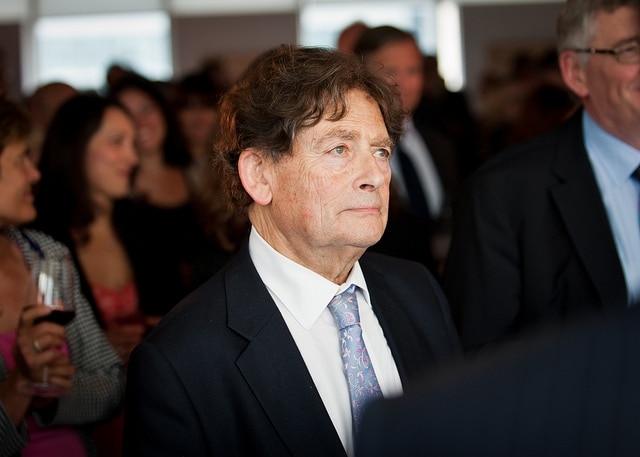EXCLUSIVE by BRENDAN MONTAGUE in PARIS
Lord Lawson’s climate denial charity the Global Warming Policy Foundation is helping a Charity Commission inquiry after one of its academic advisors was exposed as willing to author a report praising carbon dioxide while hiding donations from an oil company.
An undercover investigator from Greenpeace UK posed as a representative for a Middle East oil company and agreed a deal with GWPF‘s Professor William Happer which would see the academic advisor author the report if a donation was made to the US-based CO2 Coalition.
Lawson is the chairman for life of the GWPF, which was founded ahead of the 2009 Copenhagen Conference of the Parties (COP) climate talks in a bid to undermine efforts to reach an international agreement to reduce the production of greenhouse gasses.
The former chancellor has steadfastly refused to name the donors to his charity but told an influential Parliamentary committee and repeatedly assured the public that his charity would not accept money from anyone with a “substantial “ interest in fossil fuels.
However, an undercover investigation by Greenpeace published today to coincide with the COP21 conference taking place in Paris shows that at least one member of the charity was willing to accept cash from an oil company to publish a GWPF-reviewed report.
Professor William Happer, a member of the official Academic Advisory Council of the GWPF, was contacted by a Greenpeace investigator posing as a representative from a fictional Middle East oil company.
Secret Funding
Happer agreed to write and publish a report for the oil company extolling the environmental benefits of carbon dioxide – and keep the funding of the work secret. He said he would provide the research for $250 an hour, to be paid to the CO2 Coalition.
Happer also confirmed that he had accepted $8,000 from coal giant Peabody Energy to testify before a senate hearing, with the cash being paid to another climate denial think tank.
The timing of the revelations could not be worse for Happer as he is due to appear today as a star witness in a Senate hearing called by Ted Cruz, the republican candidate.
Greenpeace also established that Donors Trust, a shadowy US charity closely associated with the Koch Industries oil company, was willing to channel money from the fictional oil company to US climate denial groups.
Happer is a professor at Princeton University and chairman of the George Marshall Institute, which was among the earliest think tanks to attack climate science.
The Greenpeace reporter asked if the fact that the report was funded by oil could be kept secret. He was told: “If I write the paper alone, I don’t think there would be any problem stating that ‘the author received no financial compensation for this essay.’”
Quixotic Editors
He also stated: “Unless we decide to submit the piece to a regular journal, with all the complications of delay, possibly quixotic editors and reviewers that is the best we can do, and I think it would be fine to call it a peer review.”
He advised against submitting the report to a respected academic journal.
“That might greatly delay publication and might require such major changes in response to referees and the journal editor that the article would no longer make the case that CO2 is a benefit, not a pollutant, as strongly as I would like, and presumably as strongly [as] your client would also like,” he told the Greenpeace investigator.
The revelations will cast doubt over reports published by the GWPF. Publications from the charity have previously been “peer reviewed” by academics and writers including Viscount Matt Ridley.
Ridley is also a member of the advisory council of Sense About Science, which has called for strict peer review policies.
The group has previously stated: “Sometimes organisations or individuals claim to have put their studies through peer review when, on inspection, they have only shown it to some colleagues.
“Such claims are usually made in the context of a campaign directed at the public or policy makers, as a way of trying to give scientific credibility to certain claims in the hope that a non-scientific audience will not know the difference.”
It adds: “The organisation also says that: ‘reporters or advocates citing these sources as peer reviewed would show themselves to be biased or uninformed’.”
Pollution Problems
The GWPF has stood by its academic advisor and told Greenpeace: “Professor Happer made his scientific views clear from the outset, including the need to address pollution problems arising from fossil fuel consumption. Any insinuation against his integrity as a scientist is outrageous and is clearly refuted by the correspondence.”
DeSmog UK has submitted a complaint to the Charity Commission in the wake of the Greenpeace investigation.
A spokesperson stated: “I can confirm that the Charity Commission has an open case into the charity regarding this matter. As such we cannot comment further at this time.”
Dr Benny Peiser put the phone down when contacted for comment. He then emailed: “I’m afraid Greenpeace has got it wrong.”
Lord Lawson and Lord Ridley have yet to respond to emails asking whether they would conduct an internal investigation into the evidence one of its academics was willing to accept money from an oil company.
[Editor’s note: This story was revised at 10.23am on 10 December to reflect the fact the Charity Commission is investigating the Greenpeace evidence as part of an existing case, rather than opening a new file on the GWPF as was previously understood].
Subscribe to our newsletter
Stay up to date with DeSmog news and alerts






